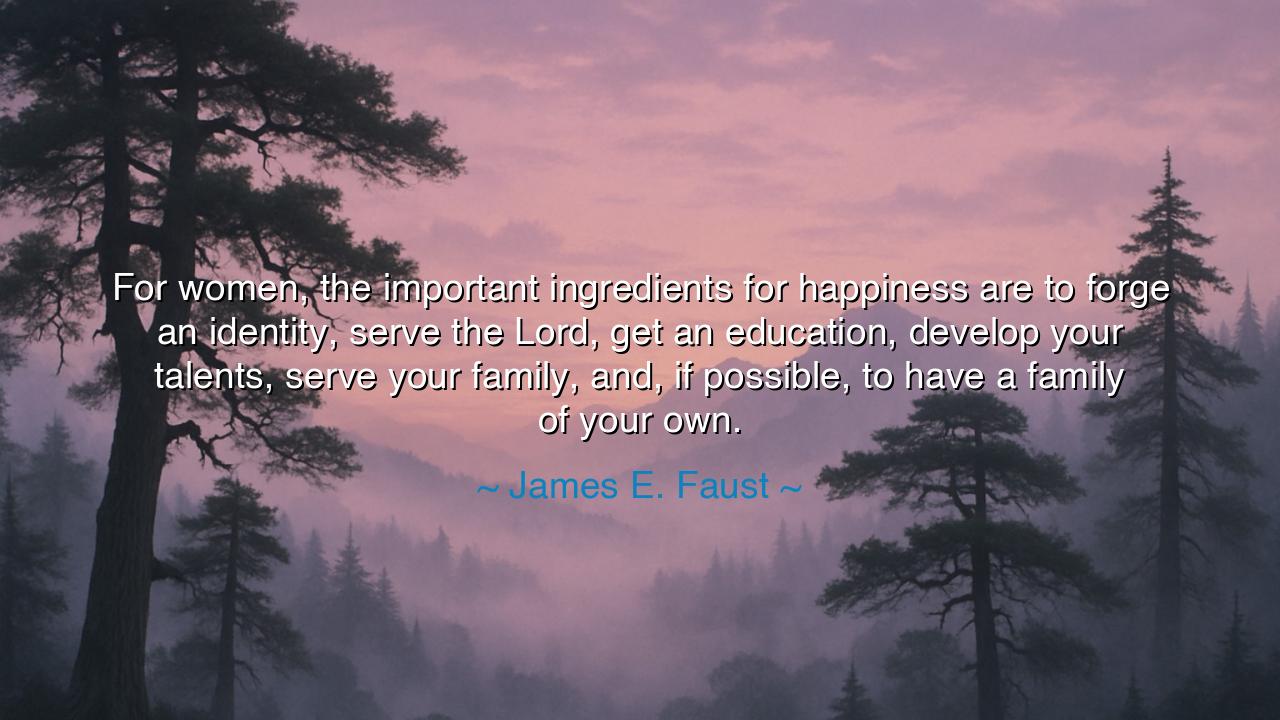
For women, the important ingredients for happiness are to forge
For women, the important ingredients for happiness are to forge an identity, serve the Lord, get an education, develop your talents, serve your family, and, if possible, to have a family of your own.






The words of James E. Faust—“For women, the important ingredients for happiness are to forge an identity, serve the Lord, get an education, develop your talents, serve your family, and, if possible, to have a family of your own”—speak with the calm authority of wisdom and the quiet fire of truth. They are not the mere counsel of a teacher, but the song of a sage—one who has looked into the heart of human purpose and found that happiness does not descend upon us by chance, but must be crafted by choice and by virtue. In these words, Faust defines not a rigid rule, but a sacred pathway: a way of living that balances faith, knowledge, service, and love. His vision is one of harmony—a life in which the spirit, mind, and heart are cultivated together until they become one radiant whole.
At the center of his teaching lies the call to forge an identity. To forge is not merely to discover, but to shape—to pass through fire and hammer until the true form emerges. In the ancient way, identity was not given by the world, but wrought through trial and purpose. To know oneself is the first victory, and it is from that victory that all others flow. Faust reminds us that for women, as for all souls, this forging is essential: one must know who she is in the eyes of God and in the strength of her own heart. This is no easy task, for the world offers countless voices that clamor to define us. But the wise woman turns inward and heavenward, until her soul stands firm, radiant with her own divine worth.
Next comes the sacred act of serving the Lord, which Faust places as the foundation of lasting joy. The ancients, too, knew that happiness untethered from reverence becomes fleeting and hollow. To serve the divine is to live in alignment with something greater than self—to let one’s life be guided by eternal principles of compassion, humility, and purpose. For when the heart serves God, every act—whether in study, in labor, or in motherhood—becomes an offering of love. It is the divine thread that binds all other virtues together, transforming daily duty into spiritual meaning.
Yet Faust’s wisdom does not end in faith alone; he calls for education and the development of talent, recognizing that faith without knowledge, and devotion without growth, are incomplete. In this he joins the chorus of the ancients who declared that wisdom is the lamp of the soul. To learn, to study, to master one’s gifts—these are not merely personal ambitions, but acts of stewardship. The talents given by heaven are seeds meant to bear fruit, and education is the cultivation of that sacred garden. A woman who sharpens her mind and hones her gifts becomes not only stronger herself, but a light to all who follow after her.
Service to family, Faust continues, is another cornerstone of happiness. In this, he invokes one of the oldest and holiest truths: that love, to be complete, must pour itself outward. Just as the ancients honored the hearth as the heart of the home, so too does Faust recognize the power of selfless devotion within the family. To serve one’s family is not to be diminished by duty, but to be ennobled by love. For through care, sacrifice, and gentleness, the spirit expands; and in giving, one receives. The family is not a burden but a crucible—a place where the virtues of patience, compassion, and resilience are refined to their purest form.
And finally, Faust adds a blessing and a hope: that if possible, every woman might have a family of her own. This is not a decree of limitation, but an acknowledgment of the deep yearning for connection written into the soul. It is the echo of the first creation, when humankind was not meant to walk alone. The family, in Faust’s vision, is both refuge and forge—where love is tested, faith is strengthened, and joy is multiplied. Yet even those without children of their own may live this principle, for to nurture, to teach, to serve others with a mother’s heart, is to participate in the same eternal law of love.
Consider, then, the life of Abigail Adams, the wife of a founding father and the mother of another. She was a woman who lived these very virtues: educated, devout, industrious, and steadfast in both family and faith. In an age that often silenced women, she forged her identity with intellect and courage, guided by conviction and compassion. Her letters still shine with the wisdom of a spirit balanced between duty and vision, faith and independence. In her, we see the living embodiment of Faust’s teaching—a woman whose happiness was not mere contentment, but the steady fire of a purpose-filled life.
So, dear listener, take this wisdom into your own heart. Forge your identity—do not wait for the world to define you. Seek God, for the soul without faith is a vessel adrift. Pursue learning, for ignorance is the dimming of the divine spark within. Cultivate your gifts, that they may serve others. Cherish your family, and where you can, nurture new life and new hope. For happiness, as James E. Faust teaches, is not found in fleeting pleasure, but in the sacred weaving of faith, service, love, and growth.
Thus, his words become not merely counsel to women, but a universal law of fulfillment—a pattern by which every soul may find peace. To live thus is to live fully: with purpose rooted in heaven, with love flowing outward to all creation, and with joy that endures beyond time itself.






AAdministratorAdministrator
Welcome, honored guests. Please leave a comment, we will respond soon